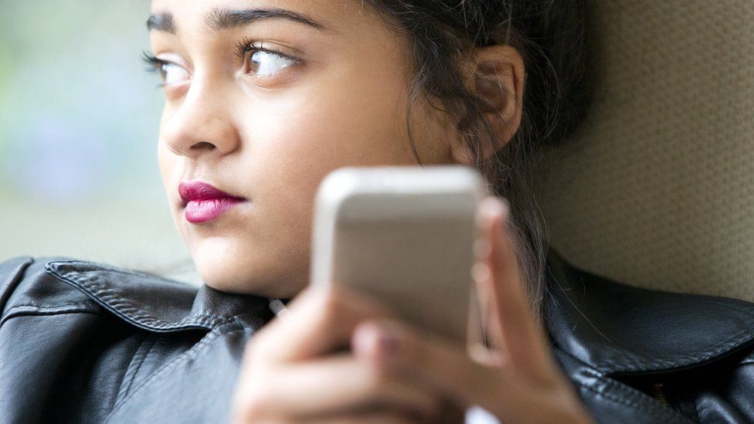Teenagers' mental health is being damaged by heavy social media use, a report has found.
Research from the Education Policy Institute and The Prince's Trust said wellbeing and self-esteem were similar in all children of primary school age.
Boys and girls' wellbeing is affected at the age of 14, but girls' mental health drops more after that, it found.
A lack of exercise is another contributing factor - exacerbated by the pandemic, the study said.
According to the research:
- One in three girls was unhappy with their personal appearance by the age of 14, compared with one in seven at the end of primary school
- The number of young people with probable mental illness has risen to one in six, up from one in nine in 2017
- Boys in the bottom set at primary school had lower self-esteem at 14 than their peers
The wellbeing of both genders fell during adolescence, with girls experiencing a greater decline, the report said.
However, it recognised that girls' self-esteem and wellbeing stabilises as they move into their late teens, whereas it continues to drop for boys.
'Solace or community'
Heavy social media use was linked to negative wellbeing and self-esteem, regardless of a young person's mental state, with more girls experiencing feelings of depression and hopelessness.
“Those who feel worse may turn to social media for solace or community,” Dr Amy Orben, research fellow at Emmanuel College, University of Cambridge, said of the research.
“It’s not a vacuum, it works both ways."
The research uses data from 5,000 young people in England from the Millennium Cohort Study.
Focus groups were also carried out in November to examine the effect of the coronavirus pandemic on these ages.
Family income, exercise and poor maternal health also contributed to young people’s mental state, the study found.
But regular exercise had a positive impact on both genders, the report said.
“Participation in activities and sports will have fallen considerably due to school closures and lockdown, likely adversely affecting mental health and wellbeing,” it added.
It also made several recommendations, including a £650m package to schools for wellbeing funding after the pandemic and an increase in mental health teaching in schools.
Young people should also have better access to resources for mental health support and physical activity, it said.
“The transition from childhood to adolescence can be turbulent, and the findings of this report underline why addressing and supporting young people’s mental health will only become more crucial as the impact of the pandemic unfolds,” said Jonathan Townsend, UK chief executive of The Prince’s Trust.
“Young people are among the hardest hit by the pandemic, so it is more important than ever that they can access support with their mental health during this critical time in their lives.”
Latest Stories
-
NACOC says recent drug busts reflect enhanced operational effectiveness
52 minutes -
Parliament’s Sanitation Committee rejects call to scrap YEA-Zoomlion contract; cites job losses
56 minutes -
SuperSport secures FIFA Club World Cup 25 broadcast rights
59 minutes -
GES to promote eligible deputy directors on Mahama’s order
1 hour -
Bank of Ghana reports 33% rise in staff-involved fraud in 2024
1 hour -
South Africa’s finance minister says he won’t resign after VAT U-turn
1 hour -
Ntim Fordjour urges equal urgency in prosecuting major drug traffickers
1 hour -
Mpraeso MP urges gov’t to hand over Damang Mine to Ghanaian firm after transition
1 hour -
‘Ghana needs watchdogs, not cheerleaders’ – Bright Simons calls out empty praise politics over IMF endorsements
1 hour -
NACOC seizes 73 suspected cocaine slabs at Swiss Port bound for Netherlands; arrests 4 Ghanaians
1 hour -
‘The IMF can’t be our conscience’ – Bright Simons warns of false security in Fund’s praise
2 hours -
FDA intensifies crackdown on fake diapers amid growing health concerns
3 hours -
Tens of thousands queue to see Pope Francis’s body
3 hours -
UK edges towards youth visa deal with EU
3 hours -
‘We are committed to assisting Ghana and other countries hit by global tariff war — IMF MD
3 hours

